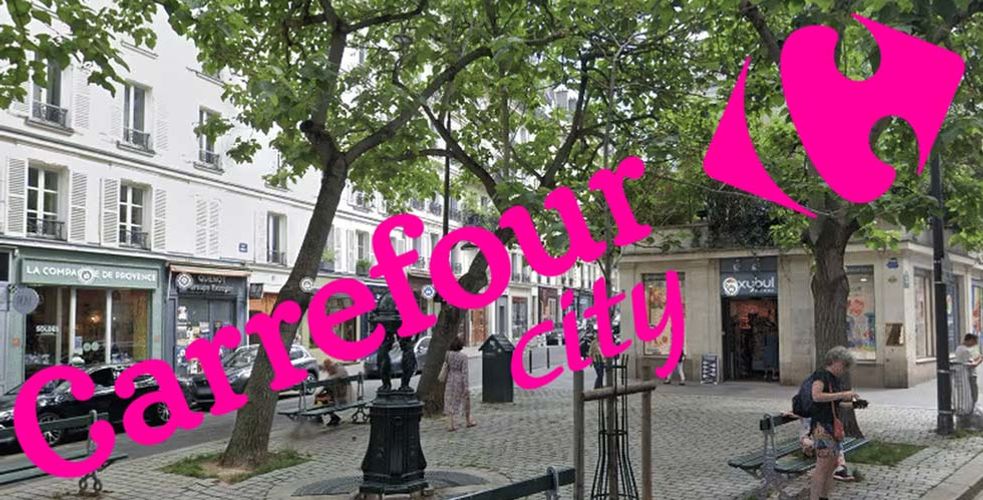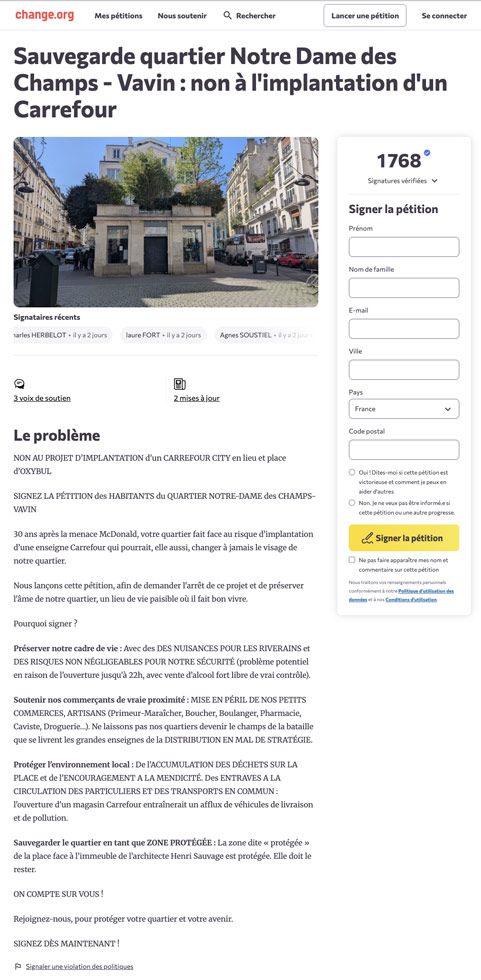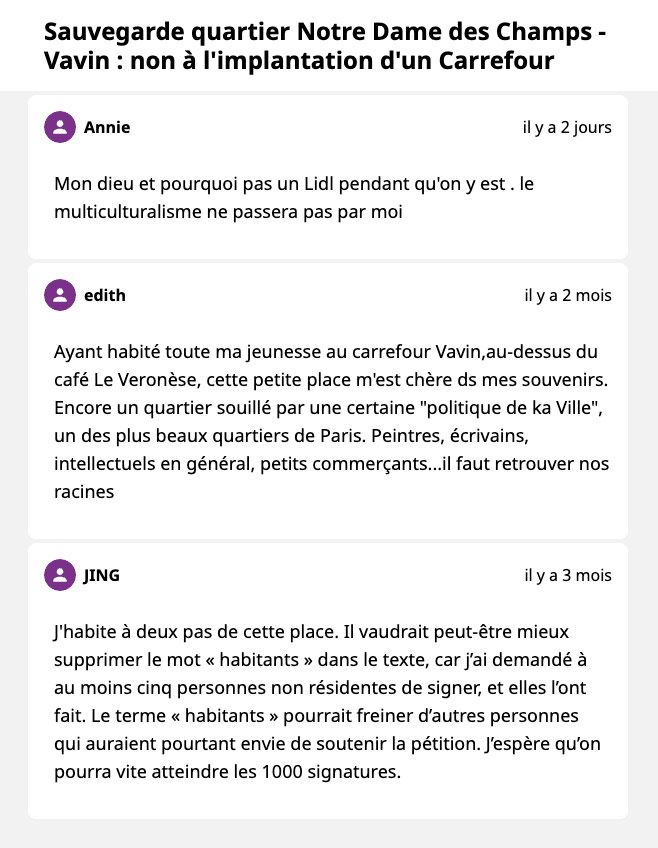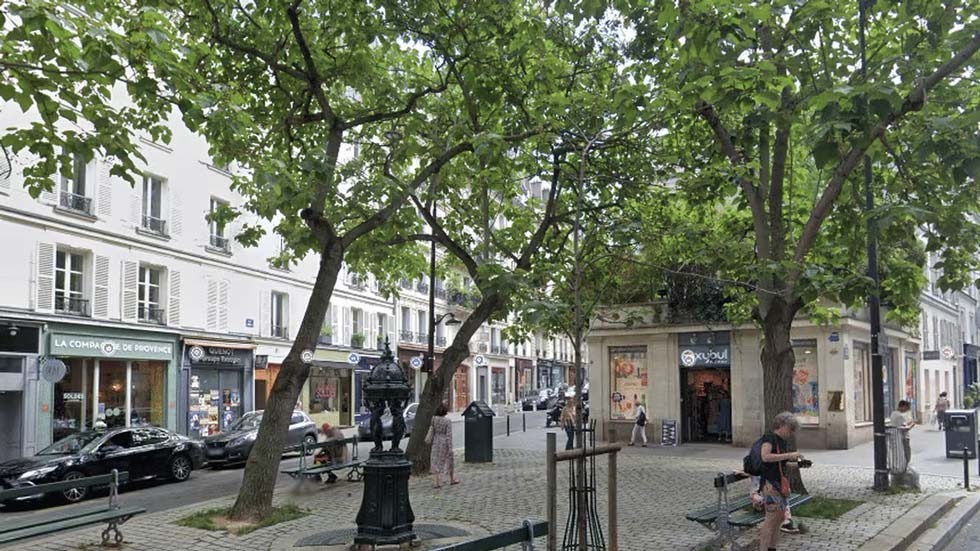Posh Paris neighbourhood says no to a Carrefour mini-market

In the peaceful 6th arrondissement of Paris, opposition to the opening of a mini Carrefour City on Rue Vavin is turning into a real class clash, against a backdrop of elitist resistance to large corporations. Start-Rite, Oxybul and the family hairdresser Simon Benbaruk, yes; the ‘riff-raff’ and deliveries linked to the possible installation of yet another mini-market, no.
A micro-market, a mega-scandal
While 2 million people are starving in Gaza and hoping for a massive food distribution, a petition with nearly 3,000 signatures is contesting the conversion of the former Oxybul store into a Carrefour City, scheduled for the end of August 2025 at 19 Rue Vavin in the 6th arrondissement of Paris. Among the petitioners are wealthy figures from the artistic, intellectual and political worlds: former Minister of Culture Jacques Toubon, essayist Alain Finkielkraut, singer Alain Souchon and his family, and actress Catherine Frot. La Lettre A and an article by Stéphanie Marteau published in Le Monde on 19 July, marred by errors, have brought to light this urban guerrilla warfare between ‘very chic opponents’ and a certain type of business and customer experience.

In the Le Monde article, some names were incorrect: neither Ruth Elkrief nor actor Pierre Richard (famous for his role in Le Grand Blond) had signed, as noted in a correction published by Le Monde. At the same time, a district mayor does not grant authorisation to open a business. Their opinion is advisory.
The main source of discontent is the expected nuisances: noise, accumulation of rubbish, begging, delivery traffic, not to mention the fear that this large retailer will kill off the small traditional shops in the neighbourhood. All of this is part of an argument that many consider disproportionate: a real storm in a teacup.
A well-established class protest
In this neighbourhood, which borders the Luxembourg Gardens and La Rotonde, a popular haunt of the elite, this unrest sounds like a very French luxury: the fear of seeing a large retail chain move in between two small cafés and a few artisan bookshops, a family hairdresser for children and adults, Simon Benbaruk, a Start-Rite shoe specialist, Le Lucernaire, a café-theatre and cinema...
Jean-Pierre Lecoq, mayor of the 6th arrondissement, doesn't mince his words. He describes the opponents as ‘a bunch of spoilt children who think everything belongs to them’, pointing to the large number of petitioners from the world of finance, who he accuses of "contributing to the demise of the least profitable local businesses ." He defends a pragmatic vision: better a Carrefour City than a fast-food restaurant open late at night, like the former McDonald's he refused in the 1990s.
Media coverage: one-sided and selective
Media coverage of this event reveals a biased perspective. Le Monde ran the headline ‘In Paris, the very chic oppose a future mini-market,’ emphasising the ‘chic’ nature of the neighbourhood and reinforcing the elitist caricature.
The journalistic treatment amplified the prestigious names and reduced the motivations to a whim of the bourgeois bohemians, without delving into the diversity of viewpoints.
Franceinfo and TF1 Info reported on the story, emphasising the slogans against nuisances and the death of small businesses, while using sensationalist headlines such as ‘Petition opposes the establishment of a mini-market in the 6th arrondissement’.
However, the dispute never escalated to the point of threatening local jobs, the safety of residents or the environment. There were no shocking figures, impact studies or contradictory testimonies from neighbouring shopkeepers: the coverage remained one-sided, fuelling the saga of ‘chic neighbourhood versus retail giant’.
The signatories: stars, misunderstandings and backtracking
Among the well-known and famous faces are
• Jacques Toubon
• Alain Finkielkraut: ‘We just want to preserve the beauty and tranquillity of this neighbourhood.’
• Alain Souchon and his sons
• Catherine Frot

Other names turned out to be mistakes:
• Ruth Elkrief firmly denied having signed: ‘I would like to make it clear that I did NOT sign the petition... I regret that he used my name in this way.’
• Pierre Richard, the actor, did not sign: only a banker with the same name appears on the list.
Denis Olivennes, mentioned among the signatories, also corrected the record: " I... am in favour of protecting the aesthetics of cities and the balance between small businesses and large retailers as much as possible," but in the context of a discussion about the disappearance of the toy store, not a outright rejection of the brand. The media personality, who advises Daniel Kretinsky, among others, published his exchanges with the journalist on X in order to correct what he had actually said.
Jean-Pierre Lecoq, the mayor breaks ranks
In contrast, Jean-Pierre Lecoq embraces his pragmatic role. He rejects the haughty stance of his opponents:
‘Most of the petitioners have worked or are working in finance. It's a village of spoilt children who think everything belongs to them.’
He also defends the arrival of a Carrefour City rather than a fast-food restaurant such as O'Tacos, which is apparently planned 50 metres away. For him, the control of an established group is preferable to fast food, which is often aggressive in terms of nuisance.
A symptomatic controversy: between urban conservatism and media vanity
This opposition illustrates a contemporary urban divide: the privileged classes invested in cultural urban planning defend an ideal of charm, authenticity and urban elitism, to the detriment of the principles of commercial diversity and social mix. Opposing them, large retailers, embodied by Carrefour, advance under the guise of democratising access to products.
The media, for their part, play the class conflict card, reducing the debate to a bourgeois farce and magnifying the mistakes of prominent figures to fuel a sensationalist soap opera, while obscuring a genuine debate on the development of the neighbourhood.
Carrefour City, but above all a social mirror
Going beyond the simple opening of a local store, this case seems to reveal an elitist stance that confuses local charm with social isolation, biased media coverage that is more concerned with creating buzz than analysing the real implications. But also, a lucid local political opposition, taking a pragmatic stance against conservatism, which is sometimes ridiculous?
News about retail and mass distribution
The mass distribution of information, defective products, food:
When we contacted him, the Mayor of the 6th arrondissement regretted the inaccuracies in the article and its late correction by Le Monde. When asked what explained such a sloppy article, Denis Olivennes added: it's summer. In newsrooms, they don't know what to write about in the summer, or perhaps they lack proofreaders and editors?

In Paris and many other French cities, we are surrounded by mini-markets and Picard stores, thanks to the activism of groups led by Alexandre Bompard and Moez-Alexandre Zouari, for example. Even Ikea is setting up shop in city centres. And fierce battles are raging between Carrefour franchisees and their former employer. These are the conflicts and concerns, in addition to the desertification of city centres, where bank and estate agency branches have multiplied and are now in decline.
Decathlon, apparently France's favourite retailer, may have caused the death of a mother by selling a dangerous snorkel: after a long battle lasting more than ten years, on 15 May a Swiss family won a court case against the Mulliez group retailer for the death of a mother on the Red Sea coast. The mother was using a kit manufactured by Decathlon, which had already been the subject of reports prior to the tragedy. The kit continues to be sold* by the retailer.
To go further
An editorial published yesterday in Le Monde is eloquent and illuminating. Entitled ‘Indignation at the destruction of Gaza is no longer enough’, it is well worth reading.
R'Gomoove, the snorkelling kit still on sale at Decathlon.
*According to the court ruling, this model of snorkel was withdrawn from sale in 2019. However, R'Gomoove, a snorkelling kit of the same name, belonging to the former Tribord range, which produced the famous Easybreath mask, is still available for purchase on the Decathlon website and in stores. It appears to have the same features, apart from the design. L'Informé has detailed the whole affair and obtained a response from the group's management.
The editorial team at En-Contact.



